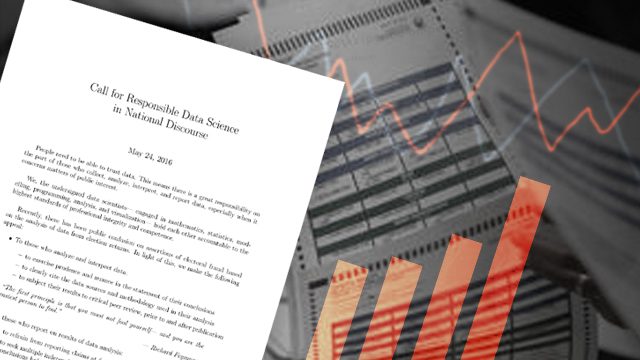SUMMARY
This is AI generated summarization, which may have errors. For context, always refer to the full article.

MANILA, Philippines – A group of over 100 data scientists made a plea for the responsible use of data in analyzing and reporting matters of public interest.
The plea sprang from “public confusion” over assertions of electoral fraud in the tight 2016 vice-presidential race between Camarines Sur 3rd District Representative Maria Leonor “Leni” Robredo and Senator Ferdinand “Bongbong” Marcos Jr.
At least 104 data science professionals and academics have signed a statement entitled “Call for Responsible Data Science in National Discourse” as of Tuesday, May 24.
“People need to be able to trust data. This means there is a great responsibility on the part of those who collect, analyze, interpret, and report data, especially when it concerns matters of public interest,” the statement said.
They appealed to those who analyze and interpret data “to exercise prudence and nuance” when arriving at conclusions, “to clearly cite the data sources and methodology used in their analysis” and to subject their findings to critical peer review.
As for those who report on the results of data analysis, the group called on them to “refrain from reporting claims at face value without careful vetting” and to seek multiple independent assessments of the validity of a certain analysis, among others.
Readers should also “view statements made by experts with a healthy amount of skepticism” and “refrain from spreading unverified claims without sufficient critical evaluation,” said the statement.
‘No evidence of fraud’
The signatories also asserted that an inverted V-shaped graph purportedly showing an irregularity in Robredo’s surge a day after the 2016 polls “does not amount to evidence of fraud.”
This trendline of Marcos’ rise and fall in the unofficial results was posted by David Yap, a former instructor of the Ateneo de Manila University, and professor Antonio Contreras of the De La Salle University.
Marcos led the partial, unofficial count of the Commission on Elections (Comelec) Transparency Server shortly after polls closed on May 9, but was overtaken by Robredo in the morning of May 10.
“Given that the votes came in from different regions at different times, the shape of the graph is, in fact, the expected pattern. Many individuals and groups carried out independent analyses and communicated technical and logical arguments arriving at this conclusion,” said the statement.
(READ: From mudslinging to math-slaying: ‘Experts’ clash on VP race result)
The signatories also emphasized the importance of peer review, saying that they have the duty “not only to be careful in the work that we do, but also to be critical of the work of others.”
“The ability to give and receive critical feedback, without personal malice, is a core value of the scientific culture, a value essential to the integrity of the scientific enterprise,” said the statement, adding that it was made “in this spirit without ill intent toward any individual, but out of a sense of duty to the community.” – Michael Bueza/Rappler.com
Add a comment
How does this make you feel?
There are no comments yet. Add your comment to start the conversation.